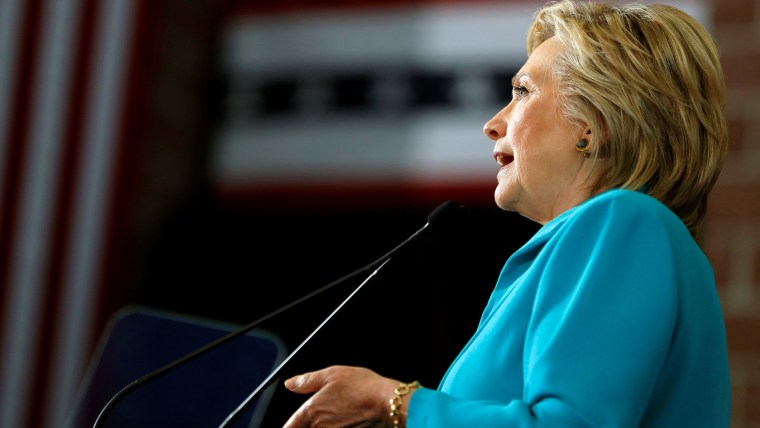"My friends, this is a moment of reckoning for every Republican dismayed that the party of Lincoln has become the party of Trump. It's a moment of reckoning for all of us who love our country and believe that America is better than this. "Twenty years ago when Bob Dole accepted the Republican nomination, he pointed to the exits in the convention hall and told any racist in the party to get out. The week after 9/11, George W. Bush went to a mosque and declared for everyone to hear that Muslims 'love America just as much as I do.' "In 2008, John McCain told his own supporters that they were wrong about the man he was trying to defeat. Senator McCain made sure they knew Barrack Obama, he said, was an American citizen and a decent person. "We need that kind of leadership again."
Clinton draws a sharp contrast between Trump, Republican Party
Democrats have to decide: Is Donald Trump the quintessential Republican or something new and dangerous? Hillary Clinton answered the question yesterday.

The Democratic Party's message for much of the year has been burdened by an important contradiction, which Dems have made little effort to resolve. Some in the party, most notably those focused on congressional races, have spent 2016 arguing that Donald Trump is the quintessential Republican -- and if you don't like the GOP's presidential nominee, you should also reject his partisan brethren who share his beliefs and priorities.
At the same time, other Democrats, including those principally focused on the race for the White House, push the exact opposite message: Trump is something altogether new and dangerous, fundamentally at odds with the Republican Party's own norms.
As MSNBC's Benjy Sarlin put it a month ago, Democrats effectively have two messaging options: "Trump is not a Republican" vs. "Trump is the ultimate Republican."
With this in mind, Hillary Clinton delivered a rather striking speech yesterday on the so-called "alt-right" movement and the racist, fringe radicals who've made Trump their standard bearer. In the process, her efforts to resolve the Democratic contradiction stood out. Referring to Breitbart News, for example, which produced Trump's new campaign CEO, Clinton said, "This is not conservatism as we have known it. This is not Republicanism as we have known it."
Also note this excerpt:
There's nothing subtle about this. Indeed, Clinton was quite explicit: Trump is "taking hate groups mainstream, and helping a radical fringe take over the Republican Party.... The de facto merger between Breitbart and the Trump campaign represents a landmark achievement for [the alt-right], a fringe element has effectively taken over the Republican Party."
It echoed a sentiment from President Obama's speech at last month's Democratic convention: "What we heard in Cleveland last week wasn't particularly Republican -- and it sure wasn't conservative."
At a certain level, it seems jarring to hear the nation's leading Democrats effectively offer a defense of the Republican Party as it struggles with an invading force. But there's a method behind the apparent madness.
As the Washington Post's Greg Sargent explained yesterday, Clinton's speech "was, in no small part, aimed at telling moderate Republican voters and GOP-leaning independents that their values aren't truly represented by the nightmare ideology otherwise known as Trumpism. He may be the GOP nominee, but he has perverted and distorted Republicanism into something so twisted and horrifying, so unlike anything else we've seen in modern times, that they shouldn't feel bound by party loyalty or political habit to stand by him."
I think that's exactly right. Why would the Democratic nominee try to separate the Republican Party from its own presidential nominee? Because she sees value in effectively inviting GOP voters to abandon their national ticket -- because despite the party labels, Trump doesn't represent their core values.
In other words, Clinton's remarks were a sweeping condemnation of an extremist ideology and a candidate who represents the paranoid fringe, but it was also an invitation to rank-and-file Republicans to reject the hijacking of their party.
Postscript: There is, of course, a school of thought that views this entire strategy as a missed opportunity: Clinton can make the case against Trump, the argument goes, but if she's not also tearing down the radicalized GOP that gave rise to Trump, the indictment is incomplete. It's a fair point, though I've seen some compelling pushback to the argument from Vox and The New Republic.